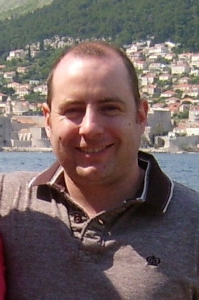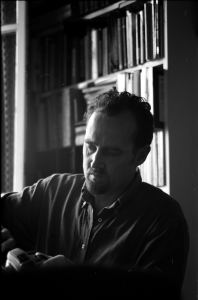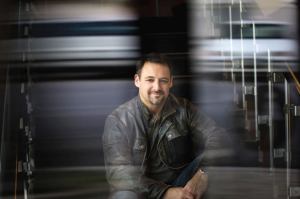Interview with Paul Gadsby (author of Chasing the game)
 Author of Chasing the game, Paul Gadsby is the author we are interviewing today. Enjoy our conversation here…
Author of Chasing the game, Paul Gadsby is the author we are interviewing today. Enjoy our conversation here…
1. Hi Paul, welcome to Thrillerbooksjournal.com. Our first question is very easy: who is Paul Gadsby as a person and as a writer?
Thank you very much, it’s a pleasure to be invited on to this great site. I’ve been passionate about writing and reading since a very early age, penning many short stories as a teenager before deciding to train as a journalist. I worked in news, sports and trade journalism in and around London for 15 years, and now write copy for a marketing company based in my native Northamptonshire. I’ve always written outside of my day job; in 2005 I co-wrote a non-fiction book about snooker called Masters of the Baize and, having really enjoyed that publishing process, decided to take full-length fiction writing more seriously. Crime fiction is my favourite genre so that’s what I write; I’ve completed a few novels to harness my craft and Chasing the Game, which has just been released, is my first published novel.
Outside of writing, I’m married and have a three-year-old son. I love watching sports (football, snooker, tennis, cricket) and quality films and TV (Goodfellas, Miller’s Crossing, The Wire, The Sopranos).
2. Where did you get the idea for Chasing the Game?
The book is based on a true story, one of the most intriguing and fascinating crimes in English history that remains unsolved to this day – the theft of the football World Cup (the Jules Rimet Trophy) in London in 1966. Three months before that year’s World Cup tournament was due to begin the trophy was stolen from its display case in Westminster Central Hall, causing England’s Football Association great shame and embarrassment. An anonymous ransom demand was made to the FA chairman and a meeting planned where the trophy would be exchanged for a hefty ransom. But the exchange never took place, one man was arrested for demanding money but was never tied to the actual theft, so the identity of the thieves remains a mystery. Bizarrely, the trophy was discovered under a hedge in a London street a week after the theft by a dog named Pickles, who became a national hero. No one knows why the trophy was placed there.
The number of unanswered questions surrounding this crime attracted me to the story, and I’ve always been fascinated by London 1960s gangland culture (Kray twins, Great Train Robbery etc) so I jumped at the chance of mixing fact with fiction to create a compelling crime thriller.
3. Can you briefly summarize the novel (without telling us too much, of course)?
Of course. The main character is Dale Blake, the newly-promoted leader of a west London criminal organization who have aspirations to force their way into the more lucrative Soho/Central London underworld scene. They hatch a plan to steal the Jules Rimet Trophy in order to collect a large ransom but, after taking the gold, internal conflicts within the firm boil to the surface and a number of things go wrong in Dale’s professional and personal life. Clement Spears, the old-school FA chairman, is furious at the theft and desperate to reclaim the trophy and gain revenge over the thieves. All these tempestuous characters and their strong motivations collide as the pressure mounts in the aftermath of this notorious crime.
4. Why might readers like it? Is there anything they might find difficult to accept in the book?
There are plenty of compelling and sympathetic characters within the book as well as a fast-paced story that keeps readers guessing right until the end. It’s a crime fiction novel first and foremost so non-football fans have plenty to immerse themselves in, while those readers who know about the Pickles story will enjoy seeing how the true-life aspects of the story combine with the fictional elements that really drive the narrative.
5. Is the Dale Blake character based on someone you really know?
No, he’s more a blend of several fictional characters (mobsters, on the whole) I’ve liked from various crime books, films and TV shows. His journey throughout the book follows a theme I was considering for a crime book a few years ago about leadership – about how some people have the natural skillset to be an effective operations man in a number two role but not necessarily the abilities to handle the wider scale responsibilities that come with being number one – and I thought it would be interesting to drop this theme into the midst of a dramatic story such as the 1966 theft.
6. Are you already working on a new book?
I am – I’ve written a first draft of another crime novel, which I’d like to polish and edit in the near future. It is about the physical and mental struggles of a recently retired boxer who gets dragged by his former manager into a murky world of crime and an underground bare-knuckle fighting circuit, while also struggling to deal with his Alzheimer’s-stricken father. It’s called When the Roar Fades.
7. Chasing the Game is available in kindle edition. What’s your opinion regarding ebooks and traditional books?
It’s an interesting debate. I definitely see how ebooks are a convenient practical option (especially when going away on holiday) and it’s nice to see the publishing industry trying to keep tabs with modern social/leisure patterns and how things are changing. But personally I’m a traditionalist. I love seeing a full bookshelf, holding a book, smelling a book. Each and every book is a physical artifact that goes on a journey encompassing several human lifetimes. Chasing the Game is available as a paperback and an ebook, and there’s nothing like holding a hard copy of your own work.
8. A suggestion to wannabe writers. A suggestion to passionate readers.
To writers: Write about themes and characters you have a genuine desire to explore, not what you think the industry wants. Your passion will then bounce off the page.
To readers: Don’t be afraid to take a chance on new writers. The publishing industry has never been more ‘top heavy’ in terms of retail sales, but it’s not the case that 95% of the world’s writing talent is restricted to the best-selling 5% of authors.
9. If you want to say anything, this is the moment…
I’ve always loved reading and writing crime fiction, and I wish it would be given more respect in certain circles within the trade. The so-called literary elite often look down on crime writing, seeing it only as a genre that delivers a cheap thrill or a whodunit puzzle. Not only is thatkind of snobbery unhelpful and disrespectful, it’s also inaccurate. Crime fiction has produced a wealth of gloriously skilled prose that has not just provided its readers with entertainment, it has enriched their lives and I believe it deserves higher recognition.
10. Would you like to say hello to our readers?
I would indeed. I love talking about great books and literature in general, and am on Twitter for that very reason. Please feel free to get in touch any time – @PaulJGadsby – I’m always happy to engage with people who love reading like me.
11. Thanks for having accepted our invitation, Paul: it’s been a pleasure having you.
The pleasure’s been all mine. Keep up the great work on Thrillerbooksjournal.com.






